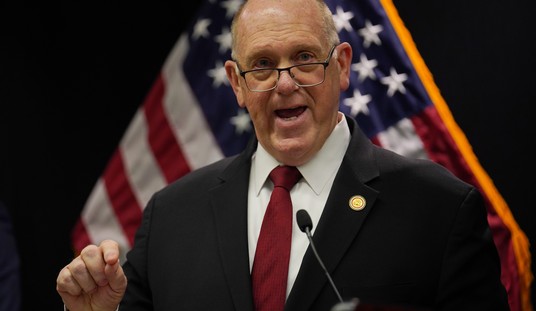Frankly, with all of the coronavirus news, this development slipped past me. It didn’t slip past Andrew McCarthy, who writes that the Department of Justice had no choice but to drop this publicity stunt from Robert Mueller and his special-counsel team. The New York Times report notes that the DoJ frames the decision as the result of the indicted Russian firms “weaponizing” the case, but McCarthy advises readers not to be fooled by that spin:
The Justice Department moved on Monday to drop charges against two Russian shell companies accused of financing schemes to interfere in the 2016 election, saying that they were exploiting the case to gain access to delicate information that Russia could weaponize.
The companies, Concord Management and Concord Consulting, were charged in 2018 in an indictment secured by the special counsel, Robert S. Mueller III, along with 13 Russians and another company, the Internet Research Agency. Prosecutors said they operated a sophisticated scheme to use social media to spread disinformation, exploit American social divisions and try to subvert the 2016 election.
Unlike the others under indictment, Concord fought the charges in court. But instead of trying to defend itself, Concord seized on the case to obtain confidential information from prosecutors, then mount a campaign of information warfare, a senior Justice Department official said.
At one point, prosecutors complained that a cache of documents that could potentially be shared with the defendants included details about the government’s sources and methods for investigation, among its most important secrets. Prosecutors feared Concord might publish them online.
Gee, who could have predicted that? Actually, anyone who has even a passing familiarity with the rules of discovery could have predicted it — and did. Fifteen months ago, after Concord Management demanded materials that led to the indictment, materials to which defendants are entitled in criminal prosecutions, Mueller’s team attempted to skirt the demand by claiming Concord had never actually been served with the indictment, an argument made ridiculous on its face by their very presence in the courtroom. As I wrote at the time, the better part of valor would have been to withdraw the indictment then and admit that it was just a narrative builder for their investigation.
Instead, Mueller passed off the mess to the DoJ, which finally dropped the matter three days ago rather than risk the discovery process Mueller’s team initiated. McCarthy offers an “I told you so” and explains why this was always a bogus PR stunt:
The businesses then pressed the government to provide them with all the evidence and other discovery the law requires prosecutors to disclose. Team Mueller countered that they couldn’t do that because it would harm national security. That’s ridiculous. Imagine if I were prosecuting a mafia hitman and refused to make discovery, reasoning that the mafia might find out what’s in my files. The judge would hold me in contempt, or dismiss the case — or both. As a prosecutor, if you’re worried that the security implications of disclosure are too great a risk, you don’t charge the case. But if you file charges, there is no getting around disclosure obligations.
Being forced to make disclosure did not go well for Team Mueller and his Justice Department successors. As they had to concede, there was no evidence that the Russians who carried out the troll farm scheme were directed by the Russian government. Stopping short of such an allegation, the indictment claimed the defendants were backed by Prigozhin — which was quite the comedown from the Justice Department’s drum-beating about Russia’s “information warfare.”
Moreover, as the trial judge groused, the troll-farm indictment was “difficult to follow.” Team Mueller’s evidence was not even strong enough to allege that the defendants were actual Russian agents. Prosecutors thus crafted, shall we say, a creative theory: The defendants had “defrauded the United States” by failing to disclose their Russian identities and affiliations, which purportedly undermined the ability of U.S. bureaucracies to maintain a registry of foreign agents and enforce the campaign-finance laws. Except . . . it was unclear that the defendants had a legal duty to report information in the first place. How do you establish the criminality of concealment if there is no requirement to disclose?
Finally, despite all the huffing and puffing about Russia’s purportedly massive effort to influence the election through social-media ads, the grudgingly surrendered discovery indicated that many of the ads violated no American laws and cost pennies. Assuming for argument’s sake that at least some of the candidate ads and rallies fell under Federal Election Commission reporting requirements, the defense contended that total expenditures for such activities amounted to less than $5,000.
That’s not to say that Russia didn’t attempt to interfere in the election, and this has nothing to do with its other operation to hack into the DNC and John Podesta’s e-mail. What it does show is that Russia likely put a few million dollars into what turned into a penny-ante Merry Prankster operation to manipulate social media in an election cycle where more than $2 billion was spent on the presidential contest, but Mueller and the DoJ couldn’t prove even that much in the end. What’s more, they likely knew it all along, but filed the indictment anyway to generate pressure on other targets to play along. They just never expected one of the defendants to show up in court, and the DoJ and Mueller ended up with their pants around their ankles.
The final lesson: Let’s make sure to bookmark this the next time anyone demands a special counsel for anything.








